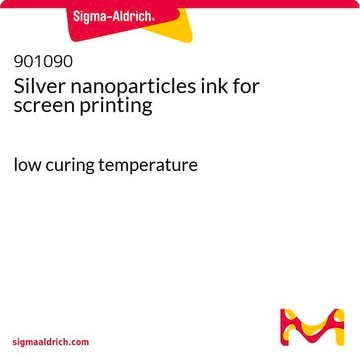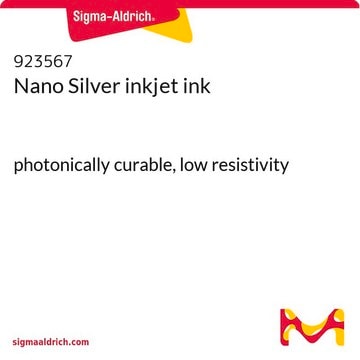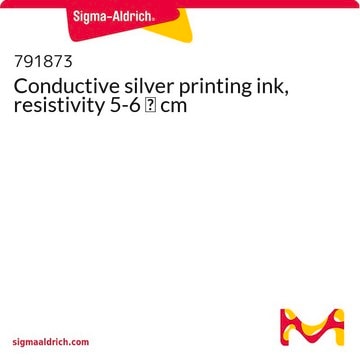901971
SunTronic® silver nanoparticle ink for inkjet printing
sintering temperature: 150-250 °C
Synonym(s):
Ag ink, Conductive ink, Silver ink, SunTronic®EMD5730
About This Item
Recommended Products
description
Sintering temperature: 150-250 °C for 10 – 60 min
Solid content: 40%
Volume Resistivity: 5 – 30 uΩ.cm
form
liquid
surface tension
28-31 dyn/cm
viscosity
11-13 cP (Brookfield)
storage temp.
2-8°C
Looking for similar products? Visit Product Comparison Guide
General description
EMD5730 can be used in the manufacture of touch panel displays, printed RFID antennae, smart cards, sensors, security labels, touch switches and other printed electronics applications.
Application
Caution
EMD5730 is supplied as ready-to-use solvent based inks, and can be printed on various deposition printers and jetted on through various piezo DOD inkjet printheads suitable for solvent based inks, although full printhead compatibility will need to be verified in each case.
Sintering conditions may change for different ink film thicknesses. Typical sintering temperature may range from 150-250°C depending on temperature tolerance of the substrate. Sintering time may range from 10-30 minutes. Electrical Resistance may be reduced with higher sintering temperature and/or longer sintering times.
Legal Information
Signal Word
Danger
Hazard Statements
Precautionary Statements
Hazard Classifications
Acute Tox. 4 Oral - Aquatic Acute 1 - Aquatic Chronic 1 - Eye Irrit. 2 - Flam. Liq. 2 - STOT RE 2 Oral
Target Organs
Kidney
Storage Class Code
3 - Flammable liquids
WGK
WGK 3
Flash Point(F)
71.6 °F
Flash Point(C)
22 °C
Certificates of Analysis (COA)
Search for Certificates of Analysis (COA) by entering the products Lot/Batch Number. Lot and Batch Numbers can be found on a product’s label following the words ‘Lot’ or ‘Batch’.
Already Own This Product?
Find documentation for the products that you have recently purchased in the Document Library.
Customers Also Viewed
Articles
Professors Tokito and Takeda share design principles and optimization protocols for organic electronic devices, focusing on flexibility and low cost.
Professors Tokito and Takeda share design principles and optimization protocols for organic electronic devices, focusing on flexibility and low cost.
Professors Tokito and Takeda share design principles and optimization protocols for organic electronic devices, focusing on flexibility and low cost.
Professors Tokito and Takeda share design principles and optimization protocols for organic electronic devices, focusing on flexibility and low cost.
Our team of scientists has experience in all areas of research including Life Science, Material Science, Chemical Synthesis, Chromatography, Analytical and many others.
Contact Technical Service












